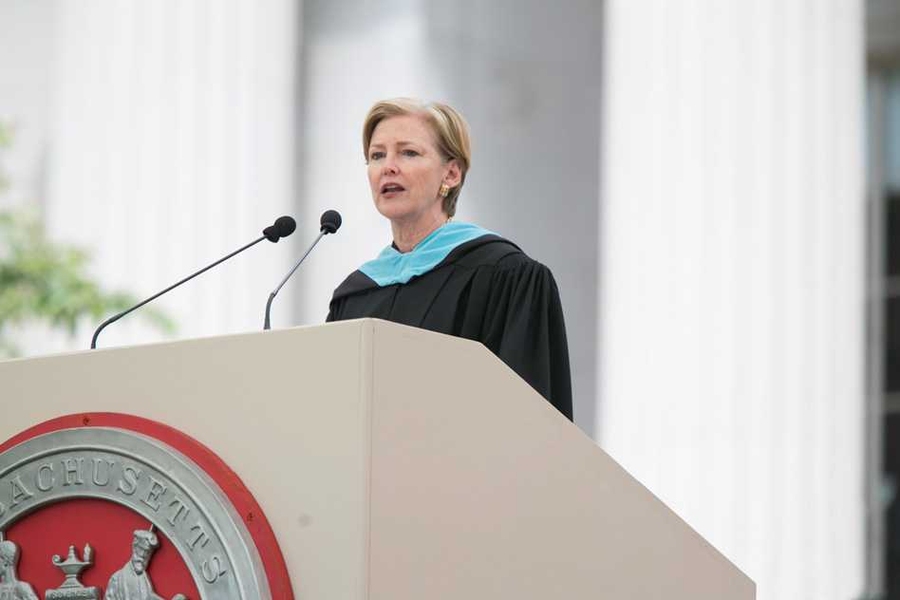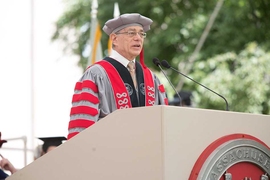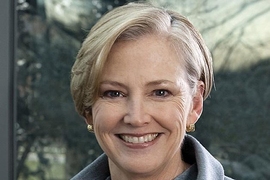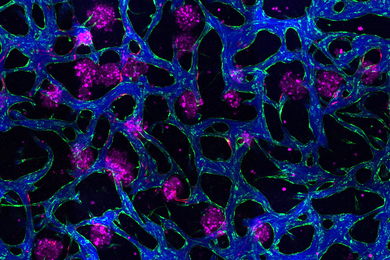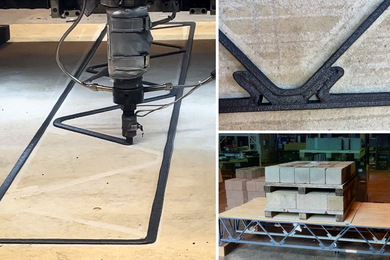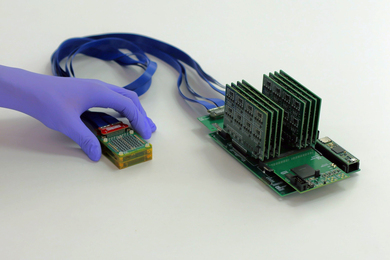Below is the prepared text of the Commencement address by Ellen Kullman, CEO and chair of DuPont, for MIT's 148th Commencement, held June 6, 2014.
President Reif, distinguished guests, graduates, families and friends:
It’s an honor to address this year’s graduating class, and to take my place in the long line of DuPont executives linked to this great institution.
In DuPont’s 211-year history, six of the 19 leaders of our company attended MIT. In fact, we owe the very existence of DuPont today to three DuPont cousins who went to MIT and who in 1902 purchased the company, which was about to be sold to a competitor from the family, and transformed it into a modern, dynamic organization operating at the intersection of science and innovation.
Of course, DuPont is not the only company to benefit from the entrepreneurial energy of MIT grads. I recently read that if the active companies founded by MIT graduates were a single nation, it would be the 11th-largest economy in the world. And that doesn’t even include my favorite Stark Industries, of Iron Man fame!
All of which speaks to MIT’s commitment not simply to intellectual achievement for its own sake, but to its practical application in ways that improve lives and benefit humanity.
It’s a commitment we embrace at DuPont, where we work to make lives better, safer, and healthier for people around the world.
We see in the MIT community a partner both in deed and in spirit. MIT is a hothouse of innovation; so is DuPont. Like MIT, we have a desire to push the boundaries of scientific discovery, and to translate knowledge into solutions that touch every level of society.
Your experience in the environment here at MIT has stretched and tested you in ways you perhaps did not think possible — and you have come out better for your efforts.
As you begin your careers, I hope you’ll discover that within every serious challenge or problem you face, there are seeds of a renewed and often better direction.
I speak from my own experience. I took the helm of DuPont late in 2008 — in the midst of the worst global economic crisis since the Great Depression of the 1930s.
It was a frightening time. There was little planning that could be done, it was near impossible to predict what could change the next day or month. It was a scenario unprecedented in my 35 years of business.
When people ask me how I led through that crisis, I tell them I relied on everything and everyone available: A strong team. Wise counselors. Dedicated employees. My own inner resources. And I learned some very specific things.
First and foremost, I learned that my training as an engineer served me well in systematically understanding and then resolving the challenge at hand. By one count, a third of my peers in S&P 500 companies also began their careers as engineers.
What’s so special about engineers? I realize that’s a loaded question at MIT, where we have scientists and engineers and others graduating today! At our core, engineers are problem solvers. In my case, I approach the problem like the mechanical engineer I am. I think about how heat, light, and water can make a difference. It’s a focus that I have used throughout my career and life, and I want to share it with you. Let me explain.
Heat is intensity. How does an idea hold up? Will it withstand all the challenges ahead? In the business world, the most intense heat can be internally generated. It’s the drive of the entrepreneurial spirit.
When I was given an opportunity to build a business segment in DuPont around Safety and Protection, I inherited six different businesses — some with very little in common with each other. I was challenged to make them work together — to build something new. I assembled the leaders in a room for two days, and I said, "We don’t leave until we figure out a way to make this a business and to grow it."
We emerged with a plan that worked. In fact, between 2002 and 2006, this unlikely group of businesses delivered the largest margin growth of any segment in the company. But it took intensity — insistence on performance and a drive for delivering results. It took heat. Don’t be afraid of heat.
Second is light. By light I mean transparency [and] enlightenment. As a business leader, I learned to look at everything from different angles; to shift my perspectives; to assume different points of view.
I will admit that this did not come naturally to me. The hardest thing I had to learn in my career is that I am not always right. I had to develop the discipline to listen. Listening doesn’t always mean agreement. You may continue to disagree, but if you take the time to listen, it will be disagreement for a reason and that tension can lead to understanding and more importantly, to new ideas. Light brings those unique thoughts that may otherwise remain undiscovered.
This is a particularly important skill for the scientist and engineer to develop, because it can often address our biggest blind spot: Sometimes the science we find so elegant, or the technology we feel is so promising, doesn’t look that way to others who view the world through a very different lens.
We have to avoid the arrogance of assuming that we’re right simply because the science is on our side. Light allows us to connect to others by showing a genuine respect for different points of view.
As you take on new opportunities and challenges, expose them to light. Look at an idea, a choice, or challenge in an unflinching manner. Be open to new ideas. Embrace new experiences. Embrace diversity of thought and people. Embrace light — shine it to spot the flaws in an idea or innovation before your competition does that for you.
And finally, with heat and light, you also need water. By water, I mean the resources [and] investment that nurture growth and health. You can never have too many of those resources. My father owned a landscaping business, and one of my earliest jobs was watering.
He said you could never count on it raining enough. For things to take root and grow, you have to have water. It’s a vital message that has stayed with me to this day and has served me well both personally, as I have raised my children, and professionally, as we make critical choices about what new ideas need.
The most vital resources [or] water for any endeavor are time and investment — in particular, your time and the investment you make in yourself. No innovative idea gets started or succeeds without heat, light, and water. They are the energy, creativity, and determination required. The stewardship of these essential resources doesn’t end with graduation — not by a long shot. For sure, in whatever field you are being awarded your degree, you know the meaning of hard work. You already know how to manage your time and invest in yourself. After all, you have succeeded at one of the most rigorous educational institutions in the world.
None of us know the challenges we will face. You will find out soon enough. My advice is, indulge yourself in constructive ways. Focus on the things that make you, and the people you love, fulfilled. That’s the real water in your life, and you can never get enough of it.
I believe my focus on heat, water, and light can be applied to projects large and small, to ideas and goals that are institutional or personal in nature. So whatever your objective — professional achievement, personal fulfillment — my message to you is to seek the intensity of heat, the insight of light, and the vitality of water to transform your life and the lives of others.
Today we honor your accomplishments, and we look forward to your contributions. Many of tomorrow’s problems are going to be solved by you as you pursue careers that draw on your talent, discipline, and way of looking at the world that brought you to MIT in the first place — and which has led to this very proud moment. It is my privilege to share it with you. I congratulate you on your achievement. I wish you well in all that lies ahead.
